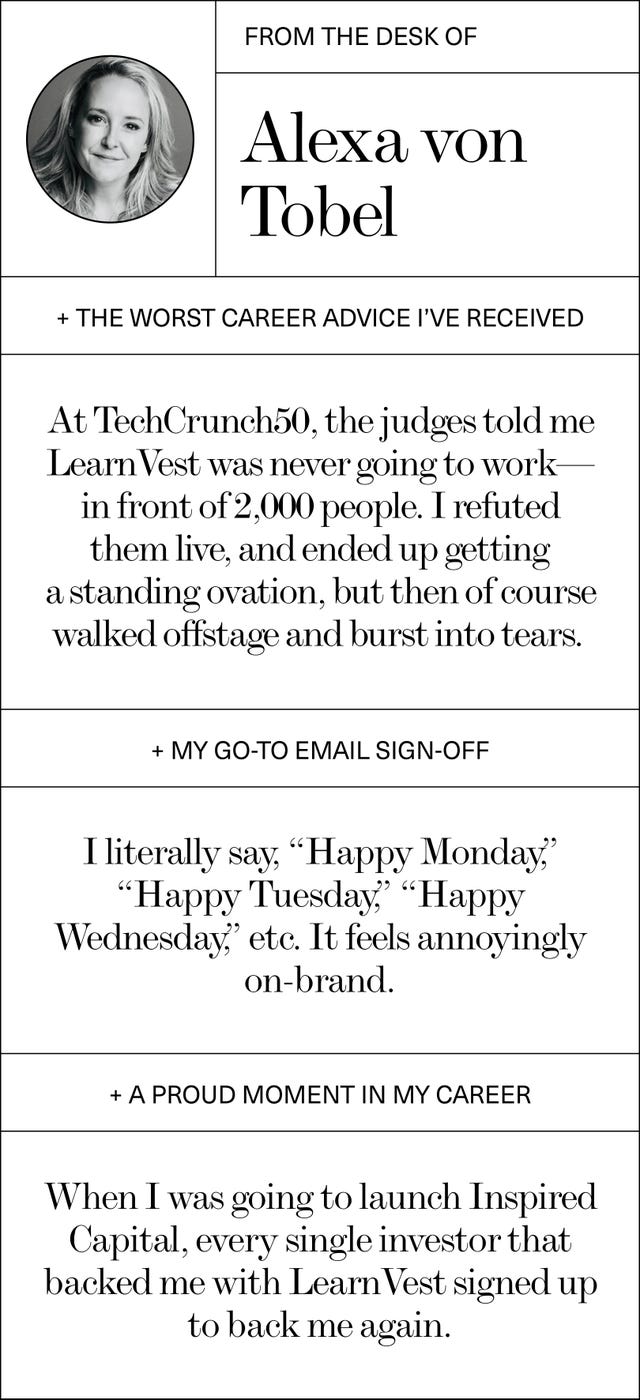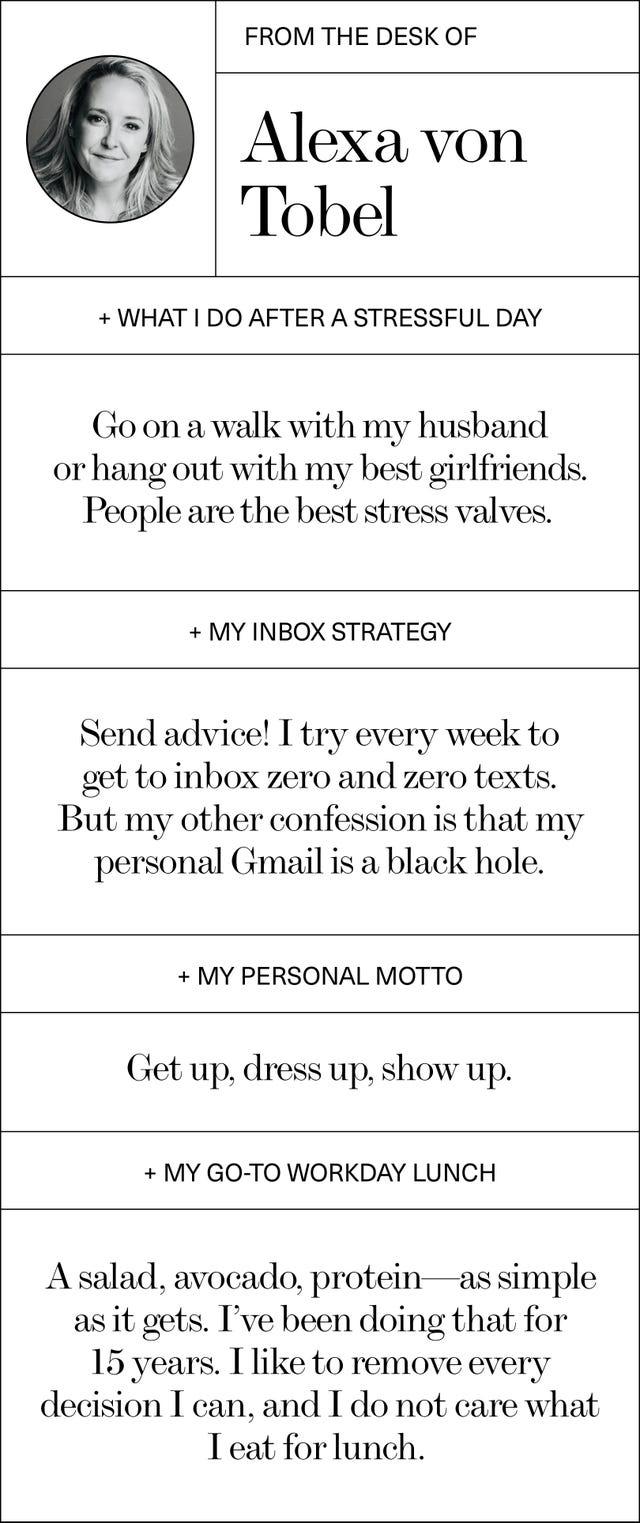Alexa von Tobel on Leaving Harvard, Building a $375-Million Company, and Her Big-Ideas Podcast


In ELLE’s series Office Hours, we ask people in powerful positions to take us through their first jobs, worst jobs, and everything in between. This month, we spoke with Alexa von Tobel. An entrepreneur from day one (read about her childhood hustles below), von Tobel dropped out of Harvard Business School in 2008 to put all her energy into LearnVest, an online financial planning platform she started to help Americans feel more in control of their money. Though she was once told—in front of thousands of people at a start-up conference—that LearnVest wouldn’t work, von Tobel sold the business to Northwestern Mutual for $375 million in 2015.
These days, von Tobel is the founder of the venture fund Inspired Capital. “We like founders who are doing the near-impossible swing,” she explains. “Then we sign up to be their partners for whatever it takes to make it happen.” She also just launched her podcast, Inspired With Alexa von Tobel, where she interviews those same kinds of enterprising pioneers. Here, she unpacks her early relationship to money, her process for making life-altering decisions, and why she believes ambitious ideas are the “light in the darkness.”
My first jobMy first real job was working in my dad’s office when I was a kid. He was a specialized developmental pediatrician who took care of children who had very unique challenges; they were autistic and, in addition to that, deaf or blind. Working there taught me two major things. One was how important it is to care for people who no one else is caring for. And the second was watching how my dad said, “Every time you meet someone, pay attention to the whole being, how they show up, the smile on their face, how they walk. That’s what I do every time I see a patient.” You wanted to see past just what they were saying and really get a sense of the whole equation. It taught me to try to observe people entirely.
My worst jobI’ll tell you one where I got in trouble. I was the kid who, instead of setting up a lemonade stand, took art, like my mom’s needlepointing, off the walls in our house and sold it. I was a gymnast, and I wanted to accumulate more leotards. I was like, “This lemonade thing isn’t going to make enough money to buy a leotard.” Entrepreneur from the start.
My relationship to money growing upI had a dad who really empowered me. I had a job as early as I legally could work, and my dad would print out my college account and my Roth IRA—as soon as you can start earning money, you can put it in a Roth IRA—and let me look at them. He was like, “This is the money that you’re saving to go to college, and this is the money that we’re helping you save to retire.” The numbers weren’t big, but I would see it grow. And then I really appreciated my education; I went to Harvard, and I was required to write the checks to school. That relationship was incredibly powerful.
I lost my dad when I was 14, and I watched my mom have to manage the finances of a household for the first time. I remember feeling like, I want to empower every family in America to feel strong. It’s not about having a lot of money; it’s about feeling in control of your money. That was where the idea for LearnVest ultimately came from.

I’ve always been an extremely positive person, where the glass is overflowing. I was like, I want to better understand what I believe is one of the biggest goals of life: to be purposeful, to be happy. And so I studied in the Happiness Lab. There, they would look at people in their nineties and [ask,] “What do you regret?” The punch line is you barely remember the mistakes, the failures; your brain doesn’t even clock them. The big regrets are the things that you knew you should’ve done and you didn’t. I always joke that 90-year-old Alexa sits on my shoulder, and she’s a tough cookie. She’s like, “If you’re going to regret [not doing] that, you got to do it.” I’m not going to remember the risks I take, so I may as well go take more of them.
On deciding to drop out of Harvard Business SchoolTo paint the picture: I was 24 years old. It was the fall of 2008. I’d started LearnVest in May 2007. I was in my first semester, and we quickly found ourselves at the bottom of the worst recession in 81 years. Every ounce of my being was like, This is when I go start this company. Every American is reeling with their finances, worried about how to make the right choices. But at that time, it was extremely uncool to drop out. Some of my best friends told me I was bonkers, but that 90-year-old Alexa kept me accountable. I had literal tears in my eyes and walked to the admissions office to take a leave of absence. And it was one of the best decisions of my life.
I moved to New York. I was a sole founder. I had no capital committed. I had nothing. There was no golden parachute to catch me. I had to be comfortable not caring what anybody else thought. I was like, I’m following my instincts, and I need to go do this.
How to make a life-altering decisionI say to people pretty regularly that this isn’t the dress rehearsal. This is life. We get one shot. And the most powerful thing you can do is follow your own path. Sometimes that means you’re going to do things that other people don’t think are great or cool or interesting, but that’s okay. One of the hardest things to do is put the earmuffs on and not let other people’s goals and inputs weigh on you.
That doesn’t mean ignore other people’s feedback, but it’s about making sure you’re clear-headed on who you want to be and what you want to do. I believe that we all have a picture of the life we’re running towards. You have to be honest. What’s that picture in your head, and are you doing the most important things every day to chart towards it? That is when you’ll be the most self-actualized.

The inspiration for my new podcast
I’m launching my new podcast with the singular lens of talking to the boldest entrepreneurs. One of my favorite things to do is talk to people doing exceptionally hard things and figure out their mindset. I’m in love with this idea of American ambition that changes the world—people who wake up every day to make things better for everyone around them. There’s a lot of darkness in the world right now. And I think ideas are the light in the darkness.
Why positivity is an underrated assetAs a mom of three kids, as somebody who mentors a lot of people, I think bringing positivity—a can-do, solutions-oriented attitude—to every equation and every problem is a really great way to move through life. And everybody can turn that on. It’s free. People are excited and attracted to positive energy.
My best career advice
My mom is a nurse practitioner, and she would say, “Alexa, love what you do, and you’ll never work a day in your life.” I called her in my early thirties, and I said, “Mom, you got one thing wrong. If you love what you do, you’ll literally work every day of your life. You’ll take everything personally. There will be no boundaries, and it will be exactly the way it should be.” Loving what you do, I think, is the key to happiness—having that place in the world where you’re doing the thing you feel like you were put on this earth to do.
This interview has been edited and condensed for clarity.
elle



